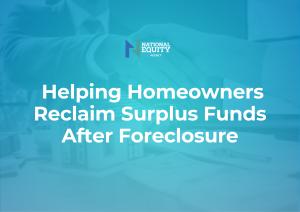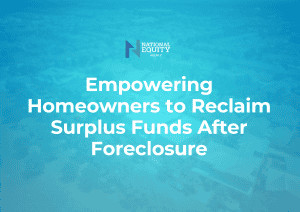Empowering Homeowners to Reclaim Surplus Funds After Foreclosure Fast Cash Home Purchases A Swift Solution To Your Property Excess Proceeds Recovery i

Empowering Homeowners to Reclaim Surplus Funds After Foreclosure

Fast Cash Home Purchases A Swift Solution To Your Property

Excess Proceeds Recovery is your ticket to potential financial gain

Ready to claim your surplus fund? Contact Us Today!

NEA
For instance, if a property with a foreclosure judgment of $200,000 is auctioned for $225,000, the surplus funds would amount to $25,000.
WEST PALM BEACH, FL, UNITED STATES, August 1, 2024 /EINPresswire.com/ — Understanding Surplus Funds from Foreclosure Sales
What are Surplus Funds? Surplus funds, often simply referred to as “surplus,” represent a vital opportunity for homeowners to reclaim equity after their property is sold at a foreclosure auction. These funds arise when the sale proceeds exceed the total debts and expenses required to settle according to the final foreclosure judgment. For instance, if a property with a foreclosure judgment of $200,000 is auctioned for $225,000, the surplus funds would amount to $25,000.
National Equity Agency: Guiding You Through Surplus Funds Recovery
National Equity Agency (NEA) is a leading professional surplus recovery company specializing in assisting individuals and organizations in recovering surplus funds from property sales, particularly after foreclosures or tax sales. Our mission is straightforward: we are dedicated to connecting people with the funds they are rightfully owed. Our team of seasoned legal experts navigates the complexities of the system to secure excess proceeds, helping you move forward from this challenging chapter of your life.
Client Testimonials Highlighting Our Success
Lisa Ashcroft:
“Andrew was very helpful and helped me access money I didn’t even know I had a right to. Him and his company did all the legal work, and kept me informed on what was happening. I was very pleased with the outcome.”
Lori McNear:
“National Equity Agency was a pleasure to work with. Andrew was a delight and always went above and beyond to make sure all of our questions and needs were taken care of in a quick and professional manner. At first our family was skeptical, but they do say what they promised to do. I would highly recommend National Equity Agency.”
Amy Johnson:
“Zachary Bayron, a recovery agent specialist at National Equity Agency, did a fantastic job recovering money from a foreclosure settlement. My brother and I were very pleased with his work. I highly recommend him.”
Cindy Cody:
“I had the pleasure of being helped by a detailed, direct, honest professional, Agent Specialist Zachary Bayron, with National Equity Agency. I also want to mention that Attorney Amanda Whipple was very pleasant and helpful. I can honestly say that what I was told is exactly what it was! Forever grateful! If not for Zach calling me about the situation, it would have been a total loss for me! Thanks again!”
Clay Noonan:
“This agency is on your side. I wasn’t aware of the money we were entitled to, and they were very helpful. Just a few forms and a little time, and you’ve got the money you are entitled to!”
Dustin Young:
“Andrew reached out to us in advance and was very professional and understanding. Knowing it was a difficult and somewhat different situation, he helped and made sure we were taken care of. I would personally recommend him and his legal department. Thank all of you.”Becoming a homeowner is a significant milestone for many individuals, symbolizing stability, security, and a place to call one’s own. However, unforeseen circumstances such as job loss, medical emergencies, or economic downturns can lead to financial hardships, including the possibility of foreclosure. While navigating the complexities of foreclosure is daunting, there exists a lesser-known opportunity that could potentially alleviate some financial strain: surplus funds.
Understanding Foreclosure and Surplus Funds
Foreclosure, albeit distressing, can sometimes result in surplus funds—a concept not widely understood by homeowners facing such circumstances. What are Surplus Funds? Surplus funds refer to the residual money left over after a property has been sold through foreclosure auction, where the sale price exceeds the outstanding mortgage debt and other associated costs. This surplus is legally entitled to the former homeowner once all creditors and lienholders have been satisfied.
For instance, if your property is auctioned for $200,000, yet you owed only $150,000 on the mortgage, you could be entitled to the remaining $50,000 as surplus funds. This unexpected windfall can potentially provide much-needed financial relief, serving as a silver lining amidst the challenges of foreclosure.
Legal Framework and Jurisdictional Variations
The regulations governing surplus funds vary widely across jurisdictions within the United States, each governed by state-specific statutes and case law. In Florida, surplus funds are managed under Section 45.032 of the Florida Statutes, delineating the entitlements and procedures for claiming these funds. It is crucial for homeowners to acquaint themselves with these legal frameworks or seek professional advice to navigate the complexities effectively.
Identifying and Claiming Surplus Funds
Determining whether surplus funds exist and asserting one’s entitlement to them can be intricate processes. Homeowners must proactively investigate and understand the specifics of their foreclosure sale, including the sale price, outstanding debts, and any subsequent surplus. This necessitates meticulous attention to detail and, often, the assistance of legal professionals experienced in real estate and foreclosure law.
What are Surplus Funds? The claiming process typically involves timely submission of a claim with the appropriate authorities, such as the clerk of courts or tax deed clerk, depending on the nature of the foreclosure sale. Compliance with statutory timelines and procedural requirements is critical, as failure to adhere to these guidelines can jeopardize one’s ability to claim the surplus funds.
Economic Implications and Market Dynamics
In dynamic real estate markets, particularly in states like Florida where property values can fluctuate significantly, the potential for surplus funds increases. Investors and developers may bid aggressively on foreclosed properties, driving sale prices above outstanding debt amounts and creating surplus funds. This economic aspect underscores the importance of staying informed and proactive in assessing one’s eligibility for surplus funds post-foreclosure. Surplus funds are extra monies above the foreclosure judgment amount held by the Clerk of Court following a sale in a foreclosure case. Surplus funds are the excess funds that are left over after a home has been sold via foreclosure. The foreclosure surplus funds calculation is based on the difference between the sale price and the amount owed to the lender. What Are Foreclosure Surplus Funds? If the purchase price at the foreclosure sale exceeds the borrower’s loan balance.
Practical Considerations and Challenges
Navigating the terrain of surplus funds involves overcoming several practical challenges. From identifying all relevant creditors and lienholders to complying with procedural requirements and deadlines, the process demands thoroughness and accuracy. Mistakes in documentation or missed deadlines can lead to forfeiture of entitlement, highlighting the necessity of professional guidance from attorneys specializing in real estate and foreclosure law.
Case Studies and Examples
Examining real-world scenarios and case studies provides valuable insights into the complexities and outcomes associated with surplus funds claims. Instances where homeowners successfully navigated the process or encountered challenges underscore the importance of preparation and legal counsel in safeguarding one’s financial interests during foreclosure proceedings. Surplus funds are also sometimes present when a homeowner has equity in the home at the time of the foreclosure sale.
Social and Legal Implications
Beyond financial implications, surplus funds can have social and legal ramifications within communities and among stakeholders. They offer a means for homeowners to recoup some of their investment in distressed properties, potentially mitigating displacement and fostering economic stability. Moreover, adherence to legal procedures ensures equitable distribution of surplus funds among rightful claimants, reinforcing confidence in property transactions and judicial processes.
Comparative Analysis and International Perspectives
While this essay primarily focuses on surplus funds in the United States, a comparative analysis with international perspectives enriches our understanding of global practices and regulatory frameworks. Countries such as Canada, Australia, and the United Kingdom also have distinct provisions governing surplus funds from foreclosure sales, offering insights into commonalities and disparities in legal treatment across jurisdictions.
What is meant by surplus funds?
Surplus funds, also known as excess funds or overage, refer to the remaining money after all debts and costs related to a foreclosure or tax sale have been paid off. These funds typically belong to the former homeowner.
What does “excess funds” mean? What are Surplus Funds?
“Excess funds” or “surplus funds” are the extra money left over after a foreclosure sale when the sale price exceeds the amount owed to creditors (such as mortgage lenders and lienholders).
Who are the surplus funds from a foreclosure sale generally belong to?
In most cases, surplus funds from a foreclosure sale belong to the homeowner whose property was foreclosed upon, after all debts and costs have been settled.
Who is entitled to surplus funds in Florida foreclosure?
In Florida, surplus funds generally belong to the homeowner whose property was foreclosed upon. However, other creditors may make claims to these funds, which can affect how and when they are distributed.
What does extra proceeds mean?
“Extra proceeds” typically refer to the additional money received from a transaction or sale after all debts, expenses, and obligations have been paid off. In the context of foreclosure, it refers to surplus funds available after paying off the foreclosure-related debts.
What happens to excess proceeds from foreclosure sales in California?
In California, excess proceeds from foreclosure sales are typically forwarded to the state’s unclaimed property division if the prior homeowner(s) cannot be contacted. Homeowners are notified of potential surplus funds via mail.
What is the excess of sale proceeds?
The “excess of sale proceeds” refers to the surplus amount left after selling an asset or property, which exceeds the amount needed to satisfy all debts and obligations related to the sale.
What is the meaning of excess funds?
“Excess funds” refer to the leftover money after all financial obligations and debts related to a sale or transaction have been settled. This term is often used in the context of foreclosure and tax sales.
Does proceeds mean money?
Yes, “proceeds” generally refer to the money received from a sale, transaction, or event. It encompasses the total amount generated from selling goods or assets.
What does your proceeds mean? What are Surplus Funds?
“Your proceeds” typically refer to the specific amount of money received by an individual or entity from a sale or transaction, after deducting any expenses or costs associated with it.
What is a proceeds payment?
A “proceeds payment” refers to any cash received as a result of selling goods, assets, or securities. It can include dividends, distributions, or payments related to the sale or repurchase of shares.
Surplus funds can refer to a few different things, including funds remaining after a foreclosure auction or funds left over from a loan or grant:
Foreclosure surplus funds: Also known as excess funds or overage, these are the funds left over after a foreclosed home is sold at auction and all liens and lenders have been paid off. They are essentially the remaining equity in the property and can be a source of financial relief for the former homeowner
Are proceeds considered cash?
Yes, “proceeds” are considered cash in the context of financial transactions. They represent the actual money received from selling assets or goods.
What is the legal definition of proceeds? What are Surplus Funds?
The legal definition of “proceeds” refers to the money or value obtained from a sale or transaction, after deducting any applicable costs, fees, or expenses.
Who does any excess funds realized at a foreclosure sale belong to?
Any excess funds realized at a foreclosure sale belong to the homeowner whose property was foreclosed upon, after all debts, fees, and costs have been satisfied.
In Florida, the owner of record on the date a lis pendens is filed is generally entitled to surplus funds after subordinate lienholders have filed claims. However, a person claiming the funds as an assignee of the owner of record’s rights must prove their entitlement to the court. To claim surplus funds, you must submit a claim to the court and the trustee, who will then determine if you are owed funds. You may need to participate in court proceedings and hearings, and you should act quickly as the funds will be kept by the court if you don’t claim them within two to three months. A lawyer can help you navigate the process, including excluding parties who don’t respond to requests for documentation or following the correct procedures.
National Equity Agency (NEA) is at the forefront of assisting homeowners in reclaiming surplus funds resulting from foreclosure and tax sales. With a dedicated team of professionals, NEA navigates the complexities of post-foreclosure scenarios, ensuring homeowners receive their entitled funds promptly and efficiently.If your property is sold in a tax deed sale and the sale proceeds exceed the amount of taxes, interest, penalties, and costs owed, you are entitled to the surplus funds. These surplus funds are typically paid to the former property owner after all the debts and costs associated with the sale have been covered.
Understanding Surplus Funds: A Q&A with NEA
What is meant by surplus funds?
Surplus funds, also known as excess funds or overage, refer to the remaining money after all debts and costs related to a foreclosure or tax sale have been paid off. These funds typically belong to the former homeowner. Those funds are called surplus funds. For example, there is a foreclosure judgment entered in the amount of $200,000. At the public auction, the real property sells for $225,000.
What does “excess funds” mean?
“Excess funds” or “surplus funds” are the extra money left over after a foreclosure sale when the sale price exceeds the amount owed to creditors (such as mortgage lenders and lienholders). Surplus funds are the extra money gained from a foreclosure sale. Sometimes properties will sell at auction for more than what is owed on the lien that led to foreclosure.
Who are the surplus funds from a foreclosure sale generally belong to?
In most cases, surplus funds from a foreclosure sale belong to the homeowner whose property was foreclosed upon, after all debts and costs have been settled.
Who is entitled to surplus funds in Florida foreclosure?
(a) “Owner of record” means the person or persons who appear to be owners of the property that is the subject of the foreclosure proceeding on the date of the filing of the lis pendens. In determining an owner of record, a person need not perform a title search and examination but may rely on the plaintiff’s allegation of ownership in the complaint when determining the owner of record.
(b) “Subordinate lienholder” means the holder of a subordinate lien shown on the face of the pleadings as an encumbrance on the property. The lien held by the party filing the foreclosure lawsuit is not a subordinate lien. A subordinate lienholder includes, but is not limited to, a subordinate mortgage, judgment, tax warrant, assessment lien, or construction lien. However, the holder of a subordinate lien shall not be deemed a subordinate lienholder if the holder was paid in full from the proceeds of the sale.
(c) “Surplus funds” or “surplus” means the funds remaining after payment of all disbursements required by the final judgment of foreclosure and shown on the certificate of disbursements.
Alexander Muniz
National Equity Agency
+1 7658965281
email us here
Visit us on social media:
Facebook
LinkedIn
Instagram
![]()
